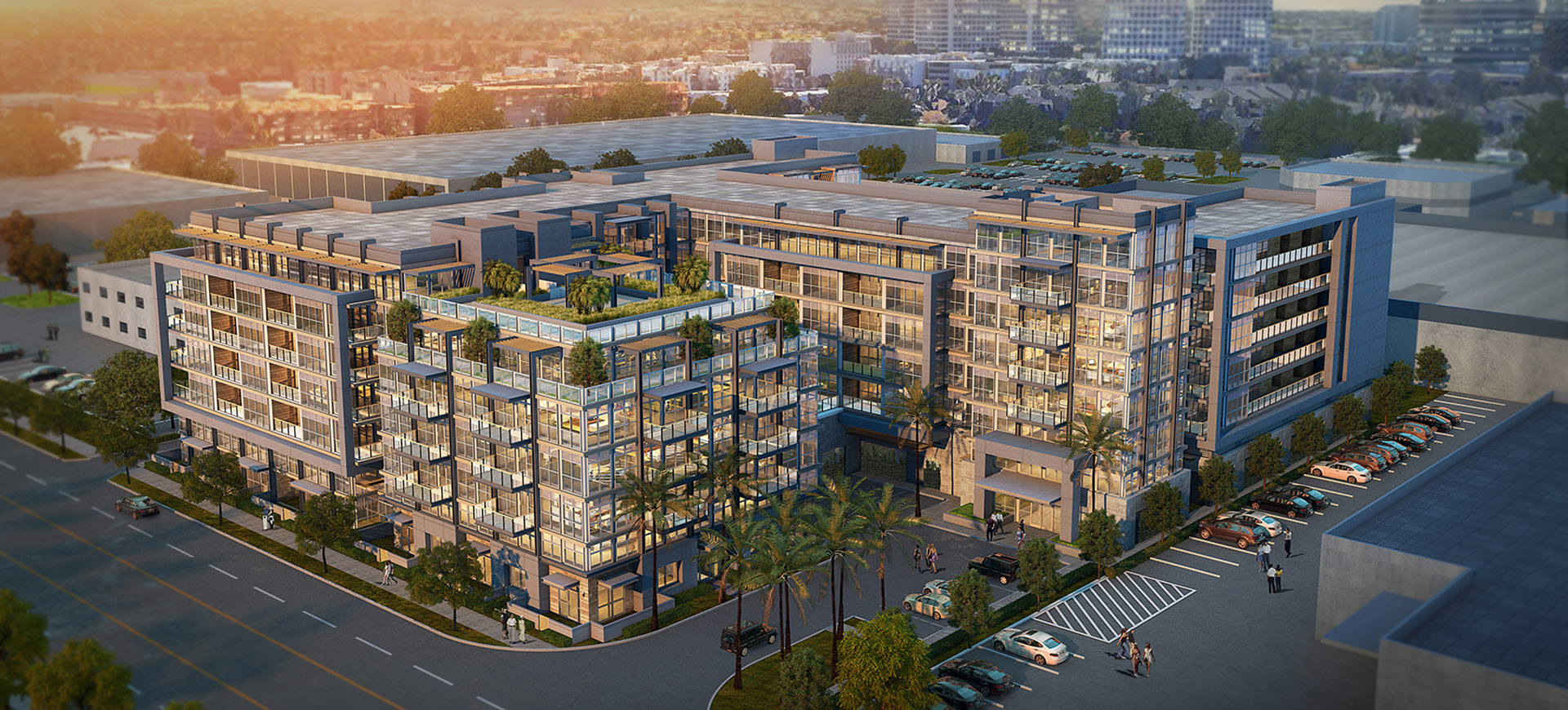By Peter J. Brennan for Orange County Business Journal
Irvine, CA —
The planned seven-story, 120-unit Blue Bay condominium project has no bay view. It sits next to a manufacturing facility and commercial offices and abuts the busy traffic on Jamboree Road in Irvine.
Architect Paul Kearney of MVE & Partners Inc. designed the project so that some units face the interior courtyard, complete with a pool, while others’ large glass windows afford a view of the Saddleback Mountains a few miles away.
“We wanted to maximize the views of the mountain to the north while internalizing everything else,” Kearney said.
Blue Bay is one of 175 active projects of MVE, which has designed some of Southern California’s most iconic projects, such as the Water Garden, a 1.2-million-square-foot office that’s the largest ever approved by the city of Santa Monica.
Nowadays, the architectural firm is developing a niche working with seven Chinese developers who want to learn the American way of building. One of those is Zhenyu “Benny” Wang, the head of Natura City LLC, which is developing Blue Bay.
“MVE is more creative. It’s not as traditional as others,” Wang said. “I thought we needed to do something different than the other buildings.”
Chinese Connection
MVE was founded in 1974 by Carl McLarand, a legendary architect who remains chief executive. Since 1977, it’s worked closely with the Irvine Co. to design well-known buildings, like the Westview apartment complex on the San Diego (I-405) Freeway next to the Irvine Spectrum and the Villas apartments next to Newport Beach’s Fashion Island.
After the 2008 financial crisis, the company had to lay off most of its staff. It began working in China, which helped save its business, according to “Orange County Inc., the Evolution of an Economic Powerhouse,” a history of prominent OC companies by the late Chuck Martin.
Wang, who has a degree in architecture from the University of Arizona, connected with MVE through acquaintances. He said his father is a developer in China and wants him to learn how to do business in the United States. Wang looked at projects in Los Angeles before settling on Irvine, where he sees younger generations, more professionals and better schools, the latter of which is particularly attractive to potential Chinese buyers.
“We’re helping him understand how to do entitlement and bring in the right people,” said Matt McLarand, a principal and son of the founder.
Pioneering Structure
Among MVE’s most prominent current projects are two 24-story buildings in the historic core of downtown L.A. and the Residences at Pacific City, a housing project south of the Huntington Beach pier that targets entrepreneurs who seek a beach lifestyle.
However, the firm is highlighting the Blue Bay project because it’s a pioneering structure not seen elsewhere in Southern California, Matt McLarand said.
MVE plans a hybrid between cheaper wooden buildings, which cost about $275 a square foot, and higher-end concrete buildings that cost $410 to $450 a square foot. It will use metal framing that will be about 25% cheaper per square foot than concrete. The design permits more luxurious features, like big windows and rooftop gardens that are beyond the capability of typical wooden apartments.
“We wanted to create a high-end building in a more cost-effective manner,” Kearney said. “There will be a lot of savings in costs, but you will still get the quality.”
Located in the Irvine Business Complex, the condos will be about 1,400 square feet with one unit capable of expanding to five bedrooms. They will sell for $750,000 to $900,000 each, McLarand estimated.
The Irvine Business Complex, the 2,700-acre swath of land covering much of the southwest, industrial portion of Irvine near John Wayne Airport, has been among the biggest sources of apartment development in OC over the past decade, with a slew of former commercial spaces redeveloped into residential projects.
As of May, more than 7,600 condos and apartments had been built there, and another 3,142 units were under construction, according to city records.
American Way
The land is scheduled to be purchased in December after tenants depart an existing structure. Irvine has granted entitlements for the project. Wang may sell the land or hire a contractor to build the project.
“The original plan was to build it ourselves, but there are some big companies that have expressed an interest,” Wang said, declining to name them.
He said Blue Bay, his first project, is teaching him the American way of doing business. Wang said a key difference between the two countries is that relationships are more important in China, where the building process is faster. In the United States, the building process takes longer, but regulations are better and the people are more professional in their fields.
“There are a lot of Chinese investors in U.S. real estate,” Wang said. “The problem is they don’t understand the United States and the culture,” Wang said. “Other Chinese investors are now coming to ask me how to build projects.”
Feng Shui, a Chinese philosophy on how to harmonize one’s environment, was used to appeal to potential Chinese buyers, including things such as placement of entries and kitchen layouts.
And what is with the name, since there is no bay in Irvine? Wang’s company has a sister project in China that’s also called Blue Bay where the nearest body of water is a reservoir 5 miles away.
“We believe water is the origin of life and has a natural affinity to humans,” Wang said. “The name Blue Bay is one of the best ways to represent our concept.”


